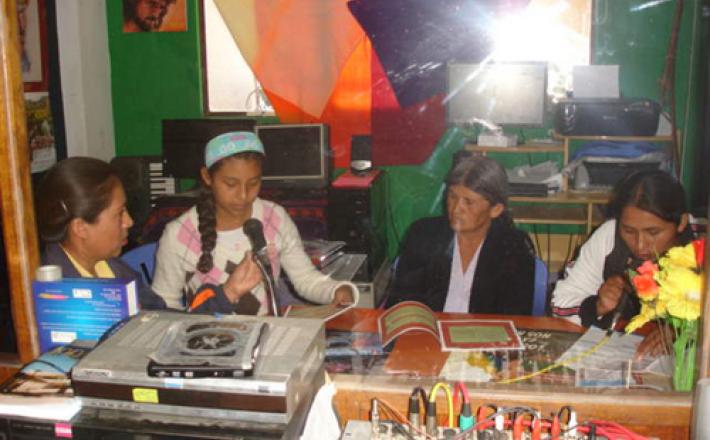Bolivia: Using the Airwaves for Empowerment of Quechua Women
“Atispa mana atispa ñawpajman rinanchis tiyan” (“Power without power, we have to keep moving forward”) in the Quechua language, Ruth Rojas told her listeners at the end of a series of radio programs on political culture, broadcast to indigenous women in Bolivia.
From the small booth in the Ecológica community radio station in the town of Cliza, located in one of the highland valleys in the central department (region) of Cochabamba, an inter-generational group of four women and girls sparked debate and reflection on topics linked to politics and women’s and indigenous rights.
They discussed the exercise of democracy, social control, gender equality, legal questions and other issues, based on their experience as indigenous women in South America’s poorest country.
Other community radio stations are involved in similar work empowering people in the highland valleys of this mainly agricultural region on the eastern side of the Andes mountains.
Throughout the department of Cochabamba, women who have never taken a course in radio broadcasting are using the airwaves to inform, empower and raise awareness, and to work for change in their communities.
Read more at Upside Down World, published 28 November 2012.

“Atispa mana atispa ñawpajman rinanchis tiyan” (“Power without power, we have to keep moving forward”) in the Quechua language, Ruth Rojas told her listeners at the end of a series of radio programs on political culture, broadcast to indigenous women in Bolivia.
From the small booth in the Ecológica community radio station in the town of Cliza, located in one of the highland valleys in the central department (region) of Cochabamba, an inter-generational group of four women and girls sparked debate and reflection on topics linked to politics and women’s and indigenous rights.
They discussed the exercise of democracy, social control, gender equality, legal questions and other issues, based on their experience as indigenous women in South America’s poorest country.
Other community radio stations are involved in similar work empowering people in the highland valleys of this mainly agricultural region on the eastern side of the Andes mountains.
Throughout the department of Cochabamba, women who have never taken a course in radio broadcasting are using the airwaves to inform, empower and raise awareness, and to work for change in their communities.
Read more at Upside Down World, published 28 November 2012.